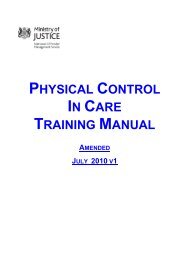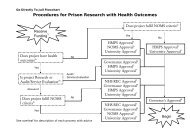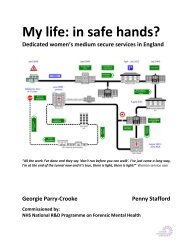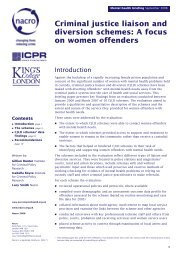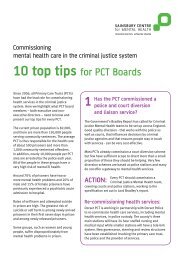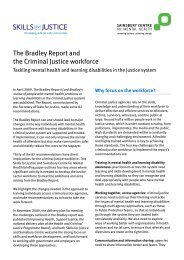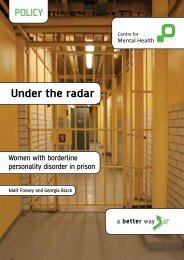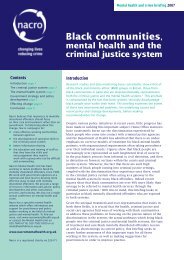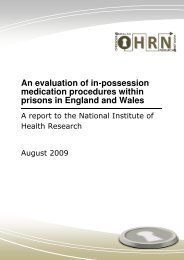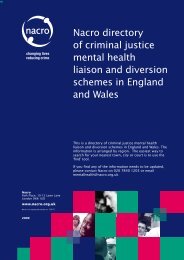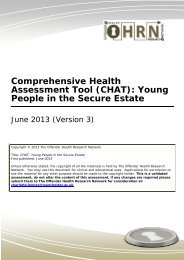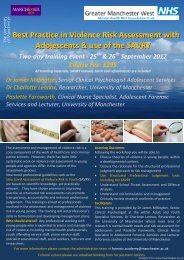Engendering Justice - from Policy to Practice - The Fawcett Society
Engendering Justice - from Policy to Practice - The Fawcett Society
Engendering Justice - from Policy to Practice - The Fawcett Society
- No tags were found...
You also want an ePaper? Increase the reach of your titles
YUMPU automatically turns print PDFs into web optimized ePapers that Google loves.
Chapter Four:Women Need <strong>Justice</strong> - Women as Victims of Crime<strong>The</strong> Criminal Injuries Compensation Scheme<strong>The</strong> Criminal Injuries Compensation Scheme makesfinancial awards <strong>to</strong> individuals who have suffered harm as aresult of violence crime and is administered by the CriminalInjuries Compensation Authority (CICA). <strong>The</strong> scheme canaward compensation ranging <strong>from</strong> £1,000 <strong>to</strong> £250,000depending on the nature of the injury plus additionalpayments <strong>to</strong> cover loss of earnings and expenses. <strong>The</strong>Ministry of <strong>Justice</strong> now has oversight of the scheme butas the House of Commons Committee of Public Accountsnoted in November 2008, the low priority given <strong>to</strong> thescheme by the Ministry of <strong>Justice</strong> “belies its importance <strong>to</strong>the Ministry’s objective of putting victims at the heart of thecriminal justice system.” 183In 2006, 64 percent of victims of violent crime wereunaware of the scheme and only 5 percent of victimsapplied for compensation. Meanwhile, the average timetaken <strong>to</strong> resolve a case in 2008 was 17 months and 30percent of applicants paid <strong>to</strong> be represented by solici<strong>to</strong>rsalthough Victim Support offers a free service. 184<strong>The</strong> Ministry of <strong>Justice</strong> and the CICA should improve themarketing of the scheme including information on: howand where <strong>to</strong> apply (such as the availability of the onlineapplication form); who is eligible; the Authority helplinenumber; and the free representation service offered byVictim Support. Regular moni<strong>to</strong>ring of the performance ofthe Authority should also be undertaken by the Ministry of<strong>Justice</strong>.<strong>The</strong> Commission was concerned <strong>to</strong> learn of instanceswhich came <strong>to</strong> light in 2008, in which victims of rape hadreceived a reduction in their compensation on the groundsthat drinking alcohol had contributed <strong>to</strong> the circumstanceswhich caused the rape or sexual assault. This approachworryingly reinforces the ‘blame culture’ directed at rapevictims. <strong>The</strong> Authority has since acknowledged that incases of rape and sexual assault the victim’s alcohol orillicit drugs consumption should not be presumed <strong>to</strong> be acontributing fac<strong>to</strong>r. <strong>The</strong> Commission recommends that clearguidance is given <strong>to</strong> caseworkers in relation <strong>to</strong> claims madeby rape victims and victims of sexual assault.Public Perceptionsand Attitudes…with conviction rates being so low what incentiveis there for a woman <strong>to</strong> report rape? Particularly daterape or where the offender is known. Some of thecomments made by Judges are also pretty disgracefuland disengage such victims. I think the services whichthe police provide have improved but the way victims areviewed is a different matter.(Questionnaire Response, Police, December 2008)Amnesty’s research in 2006 highlighted the extent of publicacceptance of sexual coercion. <strong>The</strong> research found that athird of people think a woman is partly responsible if she isdrunk or flirting with a man who later raped her. 185 Asurvey carried out with students in the U.K. in February2009 disturbingly mirrored the findings of the earlierAmnesty survey with results revealing that one in threestudents in the U.K. think a woman is responsible for beingraped if she is drunk and nearly half of students believe awoman is in some way responsible for being raped if shedoes not clearly say no <strong>to</strong> a man. 186 <strong>The</strong>se attitudes werealso evident in the Home Office commissioned telephonesurvey of 915 individuals in the UK and Wales in lateFebruary 2009. One in four respondents said a womanshould be held partially responsible if she is raped orsexually assaulted when she is drunk; one third thoughtshe would be partially responsible if she flirted heavily withthe man beforehand and 39 percent thought a womanwas partially responsible for rape or sexual assault if shedid not clearly say no <strong>to</strong> the man. 187 <strong>The</strong> Commission isvery concerned about these persistent attitudes whichwill impact on reporting rates, police investigation and jurydecision-making.<strong>The</strong>re is an urgent need for a Government-funded nationalawareness raising campaign on rape and sexual violence,similar <strong>to</strong> those used in relation <strong>to</strong> drink driving. <strong>The</strong>re arenumerous effective international campaigns <strong>to</strong> draw onin this area (see below). Additionally, attitudes <strong>to</strong> sexualviolence are formed very early and need <strong>to</strong> be addressedrobustly in schools. <strong>The</strong> Department for Children, Familiesand Schools should ensure that education on consent,Page 64



